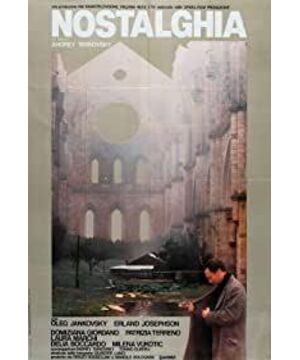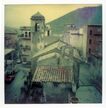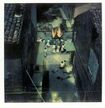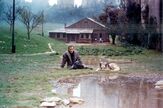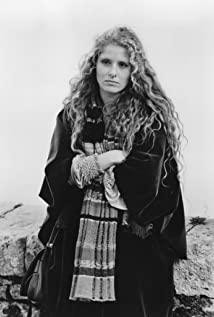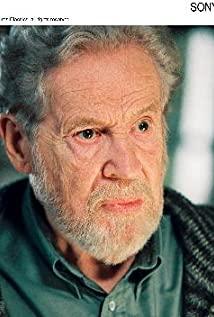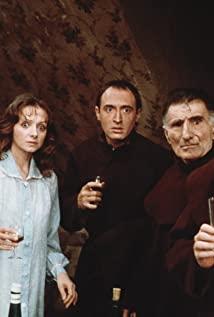"If I don’t go back to Russia, I will die, the birch forests, the air I breathed in childhood, I love my motherland." He must go back, even if it is death, because the village entrance is filled with smoke and the girls, children, and dogs waiting for him The old people, all calling out eagerly and silently, there is shocking power in the silence, like the singing of a nightingale, like the brightest string on a guitar, like the rising sun, he will be tied there forever.
Tarkovsky’s "Nostalgia" (what a beautiful word, with harmonious syllables) describes the Russian poet Gochakov who came to Italy with the Italian female translator Eugenia, facing the history of humanity. Italy, which is proud of its cultural heritage, is unsympathetic. He said at the beginning, "I am tired of this beauty." Obviously, Italy can't give him a sense of belonging. Sliding through the long and steady long lens like water, the streets covered with water stains, the ancient walls washed by rain outside the window, the color is cool, and the heavy sorrow of nostalgia like the slowly lingering mist, "You are filled with Full of all kinds of thoughts, you are not free at all." Eugenia, who wanted to seduce him, said, yes, what flashed back in his mind was the black and white country and his wife’s teeth and smiled back, as if they were lost in the depths of a dream. They have been seeking the fragrance of their hometown for a long time, but is there still a hometown for them? They have been imprisoned in their minds for the rest of their lives, and their hometown can only lie in memories and smell of dust.
"He is so melancholy, is he in love?" "No, he is thinking about something else" Russians always have a hometown complex, which is deeply ingrained and incorrigible melancholy, hometown, homeland that has passed away, only in dark dreams Woke up quietly. Their rhythm is slow, and we have lost the slowness and the homesickness---that is the deepest and most beautiful emotion. We are already in a fast-paced, materialized, and alienated world, the mind is blinded, "the path of the mind is covered by shadows", and "the mind is full of long sewage pipes." What Gochakov wanted was deeper emotions. For him, sensuality was a lively excitement on the sidelines.
"Why do you want to save me? I live in the pool", Gochakov's words in the kneeless water pool were prophetic, "I was sick from hunger and fear when I was a kid. I keep tearing my lips.//I remember I licked the salt grains/ but I can still walk...” Arsenyi Tarkovsky’s poem is here at the beginning of a conversation between the two on translation Footnote, "Poetry cannot be translated, so is music." Maybe spiritual things can't be explained in specific language. Use a pious heart and inspiration to fly freely in an infinite and vast space!
Because of the differences in cultural backgrounds and personal living conditions, we may have a hard time understanding the spiritual exile brought about by religion and being away from home, and it is also harder to appreciate the distress of those isolated intellectuals, but culture is common. The keynote of Tarkovsky’s film is the retrospective that is deeply in line with this tone. He misses Russia in the pain of reflection and introspection. No matter how hopeless, it is still their spiritual home. The exiled artists are in the cultural history. Blooming poetic light!
This film has nothing to do with love, and more isolated from romance. Eugenia and his wife are diametrically opposed people. The recollection in the memory of the latter represents the lost past, while the former is an aggressive modern woman. She could not kneel down in the Church of the Birth Mother of God and pray piously like other women, and questioned the purpose of women's survival. When she was not in love, her posture was very clear, so she and Gochakov could not go together. , Too eager for quick success (like this materialistic society), and Gochakov is a thinker immersed in slowness.
The film alluded to Christ many times, such as his wife lying quietly on the bed covered by monochromatic lights after receiving the blessing of the Virgin with a puffed belly. It resembles the loneliness of Christ after the crucifixion. It also reminds me of JD tremblingly.
In the end, Dominic finally wished to set himself on fire after preaching in Rome, as he wished to become a martyr. "Society must unite again to replace chaos. Looking at nature, you will understand that life is simple and we must return to where we are. Go to the direction you got it wrong. We must go back to the foundation of life-a source of water without pollution. You have to rely on lunatics to tell you such a world, you have to be ashamed of yourself." He represents the return to nature and the return to the original hometown. On the road, he once again fulfilled the order of going home for Gochakov. And Gochakov also completed the entrustment of wading through St. Catherine's pool with a candle in his hand. This repeated ceremony is full of a sense of sacredness that cannot be explained by logic.
Tarkovsky's lens, color, and poetic film language are already well-known to the world, so he can't do anything about it. His broad and profound thoughts are as broad and magical as the land of Russia, and mortals of my generation can only get a glimpse and get what they want, and movies are ultimately subjective products.
View more about Nostalghia reviews


